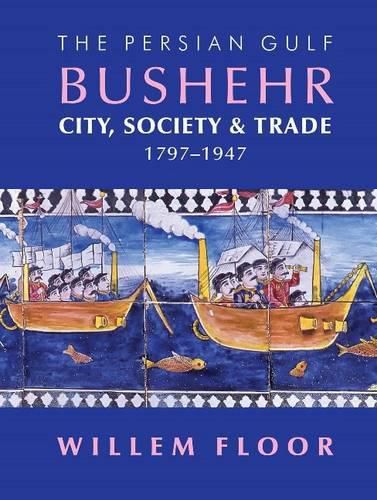Readings Newsletter
Become a Readings Member to make your shopping experience even easier.
Sign in or sign up for free!
You’re not far away from qualifying for FREE standard shipping within Australia
You’ve qualified for FREE standard shipping within Australia
The cart is loading…






This book discusses the political and economic history of the port of Bushehr, which by the end of the eighteenth century had become the gateway to southern Persia (Iran). It offers a detailed analysis of Bushehrs demography, industry, health care, education, and standard of living; as well as its trade, and how politics impacted its well-being. Throughout this period Bushehr had to ward off the growing competition from other Persian Gulf ports such as Bandar Abbas. It did so successfully, enjoying growing trade and wealth, despite internal and external political problems. Because of its important commercial position Bushehr was also twice attacked and occupied by the British (1856, 1915-18). What brought the port city down finally, however, was not the British attacks and occupations, nor the occupation and looting of the city by Tangestani tribesmen (purported protectors of the constitution) in 1909; it was the expansion of the ports, roads, and railroads of the oil-rich province of Khuzestan. This caused economic decline for Bushehr, which resulted in a loss of trade and much of its population between 1920 and 1940. The World War II years did not bring much improvement to its situation either. The economic malaise contributed to a tribal uprising in Fars in 1946, in which Bushehr played an important role. However, the uprising failed, and as such was but a last spasm of a bygone era.
$9.00 standard shipping within Australia
FREE standard shipping within Australia for orders over $100.00
Express & International shipping calculated at checkout
This book discusses the political and economic history of the port of Bushehr, which by the end of the eighteenth century had become the gateway to southern Persia (Iran). It offers a detailed analysis of Bushehrs demography, industry, health care, education, and standard of living; as well as its trade, and how politics impacted its well-being. Throughout this period Bushehr had to ward off the growing competition from other Persian Gulf ports such as Bandar Abbas. It did so successfully, enjoying growing trade and wealth, despite internal and external political problems. Because of its important commercial position Bushehr was also twice attacked and occupied by the British (1856, 1915-18). What brought the port city down finally, however, was not the British attacks and occupations, nor the occupation and looting of the city by Tangestani tribesmen (purported protectors of the constitution) in 1909; it was the expansion of the ports, roads, and railroads of the oil-rich province of Khuzestan. This caused economic decline for Bushehr, which resulted in a loss of trade and much of its population between 1920 and 1940. The World War II years did not bring much improvement to its situation either. The economic malaise contributed to a tribal uprising in Fars in 1946, in which Bushehr played an important role. However, the uprising failed, and as such was but a last spasm of a bygone era.